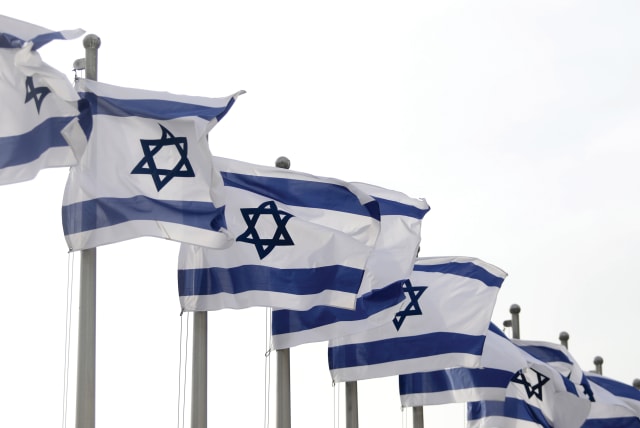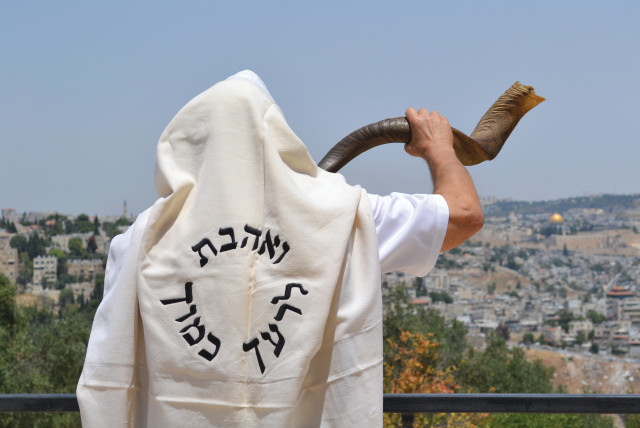Editor’s Notes: Covenants and conversations

As we pick our way through some of the most severe internal troubles in Israel's history, the inherent covenant binding the Jewish people and Israel is in peril.
Rosh Hashanah is a holiday replete with themes. Some are well-known and much discussed, like creation, repentance, forgiveness, and renewal. Others are hidden in plain sight but are no less instructive.
The holiday Musaf – a distinctive part of the lengthy Rosh Hashanah liturgy – contains three blessings unique to the day, each of which emphasizes a central theme: Malchuyot (God’s sovereignty), Zichronot (God’s remembrance), and Shofarot (God hearkening to the shofar’s call). Each blessing is introduced by a series of ten biblical verses that relate to its theme.
The verses of Zichronot discuss God’s infinite capacity to remember the events of yore, from the story of Noah, through the trials and tribulations of the patriarchs, to the Israelites’ journey through the desert on their way to the Promised Land.
Notably, more than half of the verses relate to God’s remembrance of His covenants with His people.
“And God heard their groaning cry, and God remembered His covenant with Abraham, with Isaac, and with Jacob” (Exodus 2:24), “I will remember My covenant with Jacob, and also My covenant with Isaac, and also My covenant with Abraham will I remember; and the land I will remember” (Leviticus 26:42), “He gave food to those who fear Him; He is ever mindful of His covenant” (Psalm 111), “And He remembered His covenant for them, and He relented in accordance with His abundant kindness” (Psalm 106), “I will remember My covenant with you in the days of your youth, and I will fulfill it for you as an everlasting covenant” (Ezekiel 16:60), “I will remember for them the covenant with their forefathers whom I took out of the land of Egypt, before the eyes of the nations, to be their God; I am the Lord” (Leviticus 21:45).
The blessing concludes: “Blessed are You, Lord, Who remembers the covenant.”
The theme of covenants runs like a thread throughout the High Holy Day period. The Torah portions read on the Shabbatot immediately leading up to Rosh Hashanah (full disclosure: they include my bar mitzvah portions) refer to a covenant between God and the Israelites facilitated by Moses and include exhortations to maintain it and warnings about what will happen if the people don’t live up their end of the bargain. Among the better-known selichot – penitential prayers recited throughout this period – is an 11th-century poem titled “Remember the Covenant with Abraham,” which beseeches God to redeem the Jewish people based on His covenant with their forefathers.
One of the most moving hymns sung on Yom Kippur includes the refrain, “Heed the covenant and not the evil inclination.” The emotional closing prayer of Yom Kippur, Ne’ilah, includes several dramatic recitations of God’s attributes in a final plea for forgiveness, calling on God to “remember unto us this day the covenant of thirteen [Divine attributes].”
In the Jewish tradition, covenants are endowed with tremendous power. They set the tone and the terms of the relationship between humanity and God – and, more specifically, between the Jewish people and God – and bind them to one another for eternity. Even when the people stray from their divinely ordained path, the invocation of their covenants with God can calm His wrath and secure His forgiveness.
Covenants hold great power in modern societies, as well, though they sometimes appear in different forms and under different names. Rousseau’s social contract provides a framework for understanding how societies function, positing an unwritten agreement between governments and the governed. Constitutions lay out the ideas and principles that guide our societies while setting out and limiting the powers of government. Various countries have pacts that unite their various ethnic or religious groups into cohesive national entities.
The year 5783 was one in which the covenants that bind us to one another were challenged like never before.
The impassioned national debate over the government’s judicial reform has exposed and deepened faultlines in Israeli society, further fragmenting an already divided country. Although ostensibly about the balance of powers between the different branches of government, the discourse has caused latent grievances to bubble to the surface. Right-wing, religious, and Mizrahi Israelis – who have long felt neglected and disenfranchised by a court viewed as being dominated by a left-wing, secular, Ashkenazi elite – have taken to the streets in support of the government’s legislative initiative. Secular Israelis have marched through Bnei Brak in protest of the perceived overreach of the haredi parties as they seek to exempt members of their community from serving in the army and studying a secular core curriculum in their schools – responsibilities many Israelis take for granted.
As tensions have risen, unspoken taboos have been shattered. The IDF, long considered to be above political squabbling, has been dragged into the debate. Thousands of army reservists have declared their refusal to volunteer for service unless the judicial reform is halted and reversed. Influential figures have goaded them on. Military leaders have cautioned that Israel’s readiness to fend off attack may be impaired if the scope of refusal expands.
Israel’s very Declaration of Independence – the encapsulation and embodiment of the country’s foundational principles and the document that sets out Israel’s Jewish and democratic character – has been undermined and weaponized. Describing the foundational declaration as “hasty” and its signatories as “unrepresentative,” the government’s lawyer, Ilan Bombach, argued before the High Court of Justice this week that it does not grant the court authority to strike down Basic Laws – as opponents of the judicial reform have asked it to do.
“Because 37 people were authorized to sign the hasty Declaration of Independence, which was still being drafted until the last moment, this should obligate people who came later?” Bombach asked. “It is inconceivable that 37 unelected people, without intending to, created a document that is called constitutional and will bind all future generations.”
As Israel has been embroiled in an unprecedented domestic crisis, some Jews have suggested that their attachment to the Jewish state may be in question.
“[For] many American Jews like myself, our Jewish identity is very firmly grounded in our relationship with Israel,” prominent American Jewish activist and philanthropist Susie Gelman recently told Voice of America. “People are extremely concerned and wondering if this is the Israel that they have known, loved, supported, and worked for for decades and decades. If things don’t change and Israel continues down a path of being less of a democratic state, even less of a Jewish state… I think that you will start to see people just give up, throw up their hands, and walk away.”
The relationships between the different segments of Israeli society, and between the Jewish people and Israel, are covenantal. That they are currently in peril poses one of the greatest threats to Israel and the Jewish people that we have seen in our lifetimes.
A lesson from Rabbi Lord Jonathan Sacks
The late Rabbi Lord Jonathan Sacks wrote a remarkable collection of essays about the portions of the Torah and distributed them weekly under the title Covenant and Conversation. In an introduction to a compilation of those essays, he explained:
“I have called these studies Covenant and Conversation because this, for me, is the essence of what Torah learning is – throughout the ages, and for us, now. The text of [the] Torah is our covenant with God, our written constitution as a nation under His sovereignty. The interpretation of this text has been the subject of an ongoing conversation for as long as Jews have studied the divine word, a conversation that began at Sinai 33 centuries ago and has not ceased since. Every age has added its commentaries, and so must ours. Participating in that conversation is a major part of what it is to be a Jew.”
Covenants and conversations are inextricably connected in the lives of nations and they are inherent to Jewish peoplehood. A national covenant about which there is no conversation risks becoming ossified, stale, and irrelevant, the source of grudges and discontent. Similarly, a national conversation that is not rooted in a fundamental covenant is liable to spin wildly out of control, dividing rather than uniting, tearing the nation apart from within.
As we reflect on the year that is drawing to a close and look toward the new year that is now upon us, let us recommit to the covenants that bind us to one another. Let us engage in imitatio dei, imitation of God, by remembering our covenants in moments of strife and drawing on them to inspire reconciliation. Let us never lose sight of the fundamental principles that underpin our nationhood and unite us in a common cause, even as we engage in difficult conversations about how best to interpret and manifest them in our national life.
May 5784 be the year in which the covenants between and among us are strengthened and renewed.
Shana tova.
Jerusalem Post Store
`; document.getElementById("linkPremium").innerHTML = cont; var divWithLink = document.getElementById("premium-link"); if (divWithLink !== null && divWithLink !== 'undefined') { divWithLink.style.border = "solid 1px #cb0f3e"; divWithLink.style.textAlign = "center"; divWithLink.style.marginBottom = "15px"; divWithLink.style.marginTop = "15px"; divWithLink.style.width = "100%"; divWithLink.style.backgroundColor = "#122952"; divWithLink.style.color = "#ffffff"; divWithLink.style.lineHeight = "1.5"; } } (function (v, i) { });

